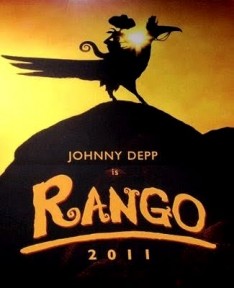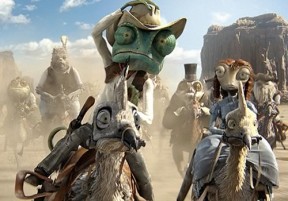Gore Verbinski’s Rango is bit like Paulo Coelho’s The Alchemist. A story about a quest and coming home to ourselves and all that matters to us. There is the desert and the thirst but we will come to those later.
The film begins at a point we all can recognise. A point where too afraid or too complacent to leave our terrariums, we play act the stories we write in our heads away from the real world where hunger and thirst are real things and not just metaphors. And where, we could leave all that we are familiar with to arrive at a dead end town without water. But as the wise armadillo (Alfred Molina) conveys in Rango, if you want water, you have to get to dirt first.
And in Rango, Dirt is literally a town of thirst. The film is an allegory, a string of metaphors that become the story and a t some point the entire story becomes a metaphor for life even though it pretends to be a cheeky Sergio Leone Western.
t some point the entire story becomes a metaphor for life even though it pretends to be a cheeky Sergio Leone Western.
And so Once Upon A Time, in a town called Dirt, arrives a chameleon, speaking in Johnny Depp’s voice, faking stories he hasn’t lived, pretending to be the hero he isn’t. This is a town of lacks, of an acute unquenched need for water and a mayor who is keeping a rebellion at bay with the biggest cliche of all. That as long people believe in something, they will go on. Even without the things they need the most.
So what or who they come to believe in, turns out to be the chameleon or Rango, a pretend hero with a pretend name. And it is he who has to lead them to water through the desert and unploughed depths though he himself has lived a pretty shallow life. First as a pet in a terrarium with plastic companions and then as the sheriff of Dirt, swaggering around in fancy hats. There is also a Clint Eastwood like Spirit Of The West that Rango runs into when he is discredited, shamed, stripped off all baubles of pretence.
It is then he learns that he has to go back and find water for the thirsty because “no man can walk out on his story.” And what do you know, this is his story. The story he was meant to live when a bump on the road sent his terrarium flying out from the back of a car into a sun baked road, to a half-dead armadillo who sent him into a desert fraught with dangers and to a hopeless town so that he could help others, experience real connections, feel crushing pain and also taste the hard-won triumph of selfhood.
Yes, it may come to pass in the future that those who control water will control everything, including how we live but the film does not ram its life lessons, its metaphors, the very real fear of depletion of something as basic as water down your throat. The writing does not baby talk, though this is supposedly a children’s film and straddles the worlds of adult darkness and childhood innocence with lines that are playful, funny and yet in places, profound. Pirates of the Caribbean director Gore Verbinski has a fascination for in your face ugliness. So as in the signature Pirate movies, here too living things ooze grotesque squalor and unkempt hairy messiness, their eyes looking out from misshapen faces. No sign of the cutesy, nicely rounded creatures you would want to pet in a Disney film.
But then this is a Nickelodeon production and may change the way animation is ideated and watched from now on. So here, you run into a creature who walks around with an arrow pierced through the eye and another who is put to death. Though, thankfully, we don’t see just how he is killed.
Loneliness both existential and social is implied in the bereft landscape and in the way Rango is asked, “Where are your friends?” A question all of us would do well to ask ourselves. Rango’s stilted conversation about being alone and getting by, with the no-nonsense and yet vulnerable love interest Beans (Isla Fisher) as they sit together and watch a vast, nightscape is a poignant comment on human isolation though the protagonists aren’t.
The animation is staggering in detail. Be it the land and aerial battles fought over a can of water, or the images of struggle and survival or the sunsets. This is a solid, thought-provoking, occasionally disturbing film for kids who are beginning to realise that life is not a Disney tale. And is a story of hope and redemption for adults who need to be reminded that thirst can be the beginning of fulfilment.
Reema Moudgil is the author of Perfect Eight. (http://www.flipkart.com/perfect-eight-reema-moudgil-book-9380032870) . More on Story Wallahs. Also check other books by Unboxed Writers in our Store.






